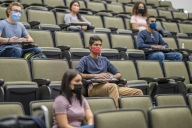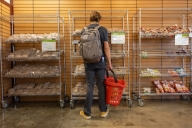You have /5 articles left.
Sign up for a free account or log in.
Colleges across the country are grappling with how to make their spring commencements more meaningful for students and parents disappointed about not being able to attend in person. With ceremonies moved to virtual formats due to the COVID-19 pandemic, one institution went out of its way to make its event stand out.
It used robots as stand-ins for the graduating students.
“To be honest, my team thought I was completely crazy,” said Sanjeev Khagram, the dean and director general of Thunderbird School of Global Management, at Arizona State University. “I was like, ‘I want robots, we’ve got to do robots!’”
Thunderbird rented telepresence robots, also known as avatar robots, so that graduating award winners could “walk” across the stage at their virtual graduations from the safety of their own homes. Students used computer controls to direct the robots -- which were topped with tablet computers showing video screens of their faces -- across the stage.
“In a typical processional, the student’s name is called, they come up and they get their diploma and I would hand it to them and they take a photo,” Khagram said. “We basically mimicked that exact process. The students could move the robot with their picture on their iPad. They could see me. I could see them. I could welcome them, congratulate them. They could say, ‘Thank you.’ I could ask them a question, we have a conversation, we take a photo.”
A video of the ceremony can be accessed here.
The business school's graduation ceremony, which was recorded last week, will be integrated into the universitywide virtual commencement ASU is celebrating on Monday.
Khagram said the school rented four robots at a cost of $1,000 each. While not all graduating students got to maneuver the robots themselves -- only those who won academic awards did so -- all students were able to send in videos or pictures so that robots topped with images of their faces could walk across the stage. In those cases the robots were maneuvered by staff members.
Khagram said Thunderbird administrative staff became pros at maneuvering the robots. Students weren’t always as adept.
“I would be in the middle of the room waiting for them to come across. They’re getting closer and closer and they’re getting more and more tentative. They're really worried they’re going to run into the dean,” he joked.
Nancy Sierras Morales, a graduate who won an award and got to control her walk across the stage, said she maneuvered the robot virtually using controls on the far left side of her computer screen. On the far right was a video where she could see her face. On the rest of her screen, she could see the stage.
“It was awkward, but it was really cool and it was really fun to see how it played out,” she said.
Sierras Morales said it wasn’t as good as an in-person graduation ceremony -- but she appreciated the effort.
“Of course I was disappointed, because obviously it’s not ideal to not have a physical graduation,” she said. “As a first-generation college student, I was really excited to have family and friends come and see me graduate and be there with me physically and be emotional and just celebrate this great accomplishment of mine. But at the same time, I think it was really cool how Thunderbird and ASU were up to creating this event.”
Caleb Dyer, another graduating senior and award winner, agreed.
"I had envisioned that graduation really wouldn’t happen, or that maybe they would just put a picture on the screen and read my name,” he said. “I was really excited when they announced that we would be operating a robot and make it as real as possible and celebrate all of our accomplishments.”
Khagram said students graduating this spring will still have the opportunity to actually walk at a future in-person ceremony. He said Thunderbird wanted to do something creative and innovative to honor the students graduating during a pandemic.
“We wanted to make something special,” he said. “You can tell your children or grandchildren, ‘I lived through COVID and I was graduating and I graduated as a robot.’”








